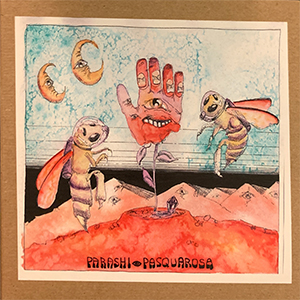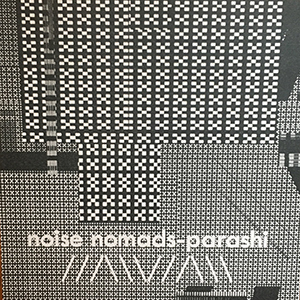 The town of Clifton Park, New York, does not have anything resembling an experimental music scene, other than the basement studio of Mike Griffin. Under the Parashi name, he has been building up an impressive catalog of releases running the gamut from ambient spaciousness to pummeling distortion. These two collaborative releases make it clear how well his personal brand of electronic mangling works alongside another artist as well, and with a contrast from Anthony Pasquarosa's largely guitar-focused work and the darker electronics of Noise Nomads, showcases his versatility.
The town of Clifton Park, New York, does not have anything resembling an experimental music scene, other than the basement studio of Mike Griffin. Under the Parashi name, he has been building up an impressive catalog of releases running the gamut from ambient spaciousness to pummeling distortion. These two collaborative releases make it clear how well his personal brand of electronic mangling works alongside another artist as well, and with a contrast from Anthony Pasquarosa's largely guitar-focused work and the darker electronics of Noise Nomads, showcases his versatility.
On the two-disc collaboration with Pasquarosa, Griffin's electronics provide a synthetic counterpoint to Pasquarosa's largely stringed instrument contributions, making for an excellent juxtaposition of conventional versus unconventional instrumentation."Ursus Minor" opens the first disc in a rather contemplative space, with complex guitar workbalanced by some sparse bass guitar and then scraping noises, but with a mix that is rather open and pleasant."Iron to Gold" is another case in which the pair keep things light, constructed from largely just intertwining guitar playing from Pasquarosa and some six string bass from Griffin.
At the other extreme would be something like "Three Sided Coin," where Griffin cranks up the pedals to create some excellent chugging electronics and Pasquarosa throws some heavy distortion and feedback on to his guitar playing to make for a harsher, yet warm and enveloping sound overall.On "Set the Timer for Last Days" there is a similar feel, with distorted rock freakouts on guitar and swelling electronics coming together with a feel that is overall looser and more free feeling compared to the deliberate performances that surround it.
The mood also varies significantly from piece to piece, such as on the frightening drones of "Ashes in the Well," in which Griffin’s crackling electronics oscillate between subtle punctuations and heavy walls.Pasquarosa’s guitar at the onset of "Times Filter (Repaired)" is initially almost new age-y in tone, but is transformed via multiple echoes and delays, and the menacing foghorn like electronics in the background keep it from becoming too airy.The darkness on "Tombstone Chips" is less menacing in nature though, and the ghostly guitar tone and haunted house ambience make it more of a '60s campfilm soundtrack than a horror one, and bonus points for the Flavor Flav/Public Enemy reference in the title.
samples:

For Sluice Gate, Griffin teamed up with Noise Nomads (aka Jeff Hartford) in a less contrasting arrangement, as both work primarily with electronics.Comparably these are also more varied, dynamic compositions where the two layer a multitude of different, often hard to distinguish sounds into complex mixes, such as the opening title piece.From an introduction of sinister amp hum and clinking bottles, Hartford and Griffin layer on passages of crunchy loops and bending frequencies, getting a bit spacier in the closing minutes.
On "Their Cherished Pseudopods," the two create a mass of sputtering electronic tweets and pulsations, and with the erratic bursts of static and noisier segments there is a sense of movement throughout that only relents in the closing moments via an orchestra of slowed down cassette tapes.The collaboration’s bleakest moments occur on "Knacker's Yard," where some pseudo-rhythmic loops collide with pounding metal and decaying tapes, casting the whole thing with a dark clang.The subsequent "Among the Vipers" is less menacing and more bizarre in sound.The duo mangle a variety of synthetic tones, twisting them in an oddly open mix punctuated with strange organic sounds.The whole thing is wonderfully erratic and as things come apart become weirder and weirder.
Taking these two collaborations in together made me appreciate Mike Griffin's work with Parashi even more than I already did.Being familiar with his solo releases, hearing how he collaborated with two distinctly different artists demonstrated not only his versatility, but also how another artist impacts his performance.The set with Anthony Pasquarosa makes it clear how he can both support a more conventional performer with his electronics, and also his ability to bounce off a guitarist like a jazz soloist would, trading their distinctly different sounds while still making for a unified piece.With Noise Nomads, there is more of a band feeling for lack of a better term.Rather than a sense of playful conflict within the instrumentation, the two work alongside each other seemingly as a single unit, layering electronic passages that seemingly become more and more abstract as the pieces continue on.The full range of Griffin's performance and compositional abilities shine through here, and with the other artists doing their own thing so well, the final products are fascinating works.
Read More

